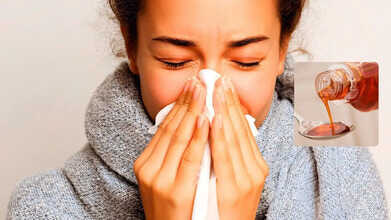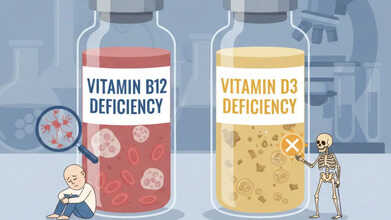- Health Conditions A-Z
- Health & Wellness
- Nutrition
- Fitness
- Health News
- Ayurveda
- Videos
- Medicine A-Z
- Parenting
Not Removing Your Mascara Before Sleep Leads To This Gross Reaction

Mascara (Credit: Canva)
Sleeping with mascara and other eye makeup products on could lead to a gross and potentially dangerous reaction inside your eyelid. This article explains the risks associated with this practice.
Imagine you've just returned home after partying for hours or attending a long meeting. Removing your eye makeup, particularly mascara, might feel like a daunting task. You decide to sleep with it intact, unaware of how detrimental it could be to your health. But not anymore.
Recently, an eye doctor, who frequently posts about eye infections on social media, revealed a dangerous and rather ugly potential side effect of wearing waterproof mascara to bed. "Your eyelashes need to be clean because they protect the eyes. They are nourished by oil glands, and if those glands or the follicles are clogged, it can become a problem," the doctor, who goes by the name Taylor, said.
In a shared video, she recounted her experience of going to bed without removing her mascara. She then advised viewers to look carefully as she moved to the side of her screen to reveal a photo of the inside of a woman's eyelid. The image showed what appeared to be mould or specks of mascara lodged in the inner side of the eyelids. She recommended that people switch to water-resistant mascara instead of waterproof ones.
A study was published in the journal Ophthalmology in May 2018 wherein a 50-year-old woman developed a serious eye condition after 25 years of heavy mascara use with inadequate removal before bedtime. The mascara had formed tiny hard deposits embedded in the skin under her eyelids—some were coming out and scratching her eyeballs. The woman also developed follicular conjunctivitis — an infection of the mucus membrane that covers the eye and eyelid.
ALSO READ:
Other Consequences
Failing to remove eye makeup before bed can also lead to pink eye or other bacterial and viral infections, health experts warn. Pink eye is what occurs when the thin membrane that lines the white of the eye and the eyelid becomes infected and inflamed. The condition is also called Conjunctivitis. Other common symptoms of Conjunctivitis include watery eyes, "Redness of one or both eyes, itching, and mild discomfort."There is evidence that leftover eye makeup like mascara, eyeshadow, eyeliner, or eyelash glue could irritate your eyes while you sleep. Mascara and liner clog the small hair follicles and oil glands on your eyelids which could lead to infections. Removing eye makeup can also prevent pink eye, scratched corneas, and styes. Also, improper skin care can cause wrinkles and discolouration at a young age. Skipping out on washing and cleansing your face can lead to the products sinking deeper into your pores. This will enlarge them and accelerate signs of ageing.
Going Through Cough And Flu? NHS Issues Urgent Cough Syrup Warning

Credits: Canva
As cough and flu season sweeps across the UK, health expert Dr Xand shared crucial guidance during today’s episode of BBC Morning Live (Jan 19) for anyone struggling with a stubborn cough. The discussion focused on coughs and colds, highlighting new research showing that human rhinovirus, a common cause of cold, can also trigger pneumonia in adults.
Flu Season In UK: Warning Signs To Watch For
Speaking with presenters Helen Skelton and Gethin Jones, as per Mirror, Dr Xand, a specialist in public and global health, explained which symptoms indicate a cough should not be ignored. He noted that a persistent cough is one of the key signs of pneumonia.
Gethin asked, "A cough happens with many illnesses, so when should someone really worry?" Dr Xand replied, "This is a big question, and plenty of people at home might be thinking, 'Is this serious?' because coughs can linger for a long time."
He continued: "Viruses like respiratory syncytial virus (RSV) can cause what’s known as the 'hundred-day cough,' and people can be coughing for weeks wondering what’s going on."
Dr Xand advised viewers to follow the NHS guidelines for coughs, saying, "The NHS recommends consulting your doctor if a cough persists for over three weeks. Many coughs last three to four weeks, and you’ll usually notice if they’re improving. Right now, the most common cause is a virus."
Dr Xand’s Cough Syrup Alert
Addressing people from home about cough syrups, Dr Xand highlighted the latest NHS guidance. He suggested trying more natural remedies, which can be just as effective. "The NHS does not actually recommend cough syrup," he explained. "It advises hot lemon with honey instead."
The official NHS website confirms that "hot lemon with honey has a similar effect to cough medicines." This simple remedy can soothe the throat, calm irritation, and reduce the cough reflex. Some studies even suggest it works as effectively as certain over-the-counter medicines, particularly for children over one year old. However, it’s important to note that it doesn’t treat the underlying illness.
What Do Cough Syrup Studies Show?
Research shows that most over-the-counter cough medicines offer minimal benefits. Studies, including those from the Cochrane Collaboration, reveal that they perform little better than a placebo for short-term cough relief in both adults and children.
While these syrups may temporarily ease throat irritation or provide a sense of relief, ingredients such as dextromethorphan and guaifenesin often do no better than sugar pills. Much of the perceived benefit comes from the placebo effect or the body’s natural recovery.
Instead, simpler measures like honey, staying hydrated, and using painkillers such as paracetamol or ibuprofen are often more effective. Most coughs caused by colds simply need time to resolve.
Cough Syrup: Red Flags To Watch For
Dr Xand shared the warning signs people should be aware of. "There are several red flags worth noting. High fever, chills, or unexplained shortness of breath are all reasons to see a doctor immediately. You should be able to breathe normally, and if you can’t, that’s a concern."
He added, "Any chest pain with a cough, very thick mucus, or extreme fatigue are also serious signs. More severe warning signals include trouble breathing, bluish lips or fingertips, confusion, mental changes, prolonged high fever, and a rapid heart rate."
"It’s crucial to act quickly," Dr Xand continued. "I’ve seen cases in my own family where someone went from a mild cough to being extremely unwell in just a day. Sudden deterioration can be life-threatening, so early medical help is essential."
Pneumonia Can Be Subtle but Serious
Dr Xand emphasized, "Pneumonia can sometimes develop quietly. It isn’t always dramatic, but it can be fatal. That’s why it’s so important to monitor symptoms and seek medical help promptly if things are getting worse."
Vitamin B12 And D3 Deficiencies Could Lead To Serious Health Issues, Experts Warn

Credits: AI Generated
Vitamin deficiencies are often brushed aside as minor nutritional gaps. Many people assume they can be fixed later or ignored until something feels seriously wrong. According to Dr Prabhat Ranjan Sinha, Senior Consultant, Internal Medicine at Aakash Healthcare, this casual attitude can be risky, especially when it comes to Vitamin D3 and Vitamin B12. Both nutrients play a central role in bone strength, nerve function, immunity, and energy levels. When their levels drop, the damage may build quietly and surface only when daily life starts to feel difficult.
Vitamin D3 and Vitamin B12 are essential for overall wellbeing. Their deficiency may not cause obvious symptoms at first, but over time they can affect how the body functions, how often a person falls sick, and how energetic or mentally sharp they feel.
Vitamin B12 And D3 Deficiencies: The Sunshine Vitamin And Why It Matters
Vitamin D3, often called the sunshine vitamin, is produced by the body when skin is exposed to sunlight. Along with calcium, it helps maintain strong bones and reduces the risk of fractures. Low levels of Vitamin D3 can weaken muscles, increase the risk of falls, and raise the chances of bone disorders such as osteoporosis. In children, severe deficiency can lead to rickets, a condition that affects normal bone growth.
Dr Sinha explains that Vitamin D3 does more than support bone health. It also plays a key role in immune function. People with low levels may fall sick more often and take longer to recover from infections. Research has also linked deficiency to higher levels of inflammation in the body.
Despite living in a country with abundant sunlight, Vitamin D3 deficiency is widespread. Urban lifestyles keep many people indoors for long hours. Regular use of sunscreen, limited outdoor activity, and aging all reduce the body’s ability to produce and absorb this vitamin. Diet alone rarely provides enough Vitamin D3, which is why deficiency remains common even among people who eat well.
Vitamin B12 And Its Silent Impact
Vitamin B12 is equally important but often overlooked. It is essential for nerve health, brain function, and the production of healthy red blood cells. Unlike some deficiencies that show early warning signs, B12 deficiency tends to develop slowly. Its symptoms are often mistaken for stress, aging, or routine fatigue.
Low Vitamin B12 levels can cause weakness, persistent tiredness, tingling or numbness in the hands and feet, memory problems, mood changes, and difficulty concentrating. Over time, untreated deficiency can lead to nerve damage and anemia.
Certain groups are at higher risk. Vegetarians and vegans often do not get enough B12 because it is mainly found in animal-based foods. Older adults may struggle to absorb B12 due to reduced stomach acid. People with digestive disorders and those taking long-term acid-reducing medications are also more vulnerable.
Why These Deficiencies Are Missed?
One of the biggest challenges with Vitamin D3 and B12 deficiencies is that their symptoms overlap with many common health complaints. Ongoing fatigue, joint pain, low mood, or frequent illness are often blamed on work stress, poor sleep, or lifestyle habits. As a result, people delay medical advice until symptoms start interfering with everyday life.
Dr Sinha notes that this delay can make recovery slower and complications more likely.
Vitamin B12 And D3 Deficiencies Diagnosis And Timely Care
Simple blood tests can accurately detect Vitamin D3 and B12 deficiencies. However, many people only get tested once symptoms become severe. Early diagnosis allows for timely treatment, which may include supplements, dietary changes, and lifestyle adjustments under medical guidance.
Addressing these deficiencies early is one of the simplest ways to protect long-term health. Adequate sunlight exposure, balanced nutrition, and routine screening can help maintain healthy levels. Taking Vitamin D3 and B12 deficiencies seriously is a small step that can prevent lasting health problems and support healthier aging.
Why Do Sinus Problems Spike In Winter? Doctor Reveals

Credits: Canva
As winter approaches, many people notice an increase in sinus- and ear-related issues. Symptoms such as nasal congestion, facial pressure, headaches, ear pain, and dizziness become more frequent during this season. According to Dr. Swapnil Brajpuriya, Associate Director & Head Unit II – ENT at Asian Hospital, the combination of cold air, low humidity, and sudden temperature changes are the main reasons why sinus and ear problems worsen in winter.
Why Does Cold Air Cause Sinus Blockage?
The sinuses are air-filled cavities within the facial bones that connect to the nose and play a key role in the breathing process. During winter, the cold, dry air dries out the nasal lining, causing the mucus to thicken. Thickened mucus slows down normal sinus drainage, leading to congestion and blockage.
Dr. Brajpuriya explains, “In winter, the nasal mucous membrane tends to dry out, preventing proper drainage of mucus from the sinuses. This leads to congestion and sinus blockage.”
The Link Between Ear Heaviness, Headache, and Dizziness
The sinuses and ears are connected via the Eustachian tube, which regulates pressure between the middle ear and the environment. When sinus inflammation or blockage occurs, it can create pressure in the ears, causing a feeling of fullness, reduced hearing, headaches, and sometimes dizziness.
“Sinus infections can block the Eustachian tube, causing pressure buildup inside the ear. This pressure is often responsible for the headaches and dizziness experienced by patients,” says Dr. Brajpuriya.
Why Are Infections More Common in Winter?
Winter months often mean spending more time indoors in closed, crowded spaces, which increases the risk of viral and bacterial infections spreading. Additionally, colder temperatures and seasonal changes can weaken the immune system, making common colds and flu more likely to develop into sinusitis or middle ear infections.
Dr. Brajpuriya adds, “If a cold or flu is not treated promptly, it can progress to a sinus or middle ear infection, particularly in children and the elderly.”
Who Should Be Extra Careful?
Certain groups are more susceptible to sinus and ear problems during winter. People with allergies, asthma, frequent colds, weak immunity, or pre-existing sinus conditions need to be extra vigilant. Smokers are also at higher risk, as smoke can irritate the nasal and sinus lining, exacerbating congestion and inflammation.
Sinus Treatment and Prevention Tips
To manage and prevent winter-related sinus and ear issues, Dr. Brajpuriya recommends the following precautions:
- Keep your nose and ears protected from cold air using scarves or masks.
- Stay hydrated by drinking plenty of water to keep mucus thin.
- Minimise exposure to dust and allergens indoors.
- Seek medical advice if nasal congestion, ear pain, or dizziness persists for more than a few days.
He emphasizes, “Neglecting sinus and ear problems can lead to chronic infections. Timely treatment and proper care are essential to prevent complications.”
Cold air, dry weather, and viral or bacterial infections are the key factors behind the increase in sinus and ear problems during winter. With simple preventive measures, adequate hydration, protecting the nose and ears, and seeking early medical care, most people can manage these seasonal issues effectively and reduce the risk of complications.
© 2024 Bennett, Coleman & Company Limited

